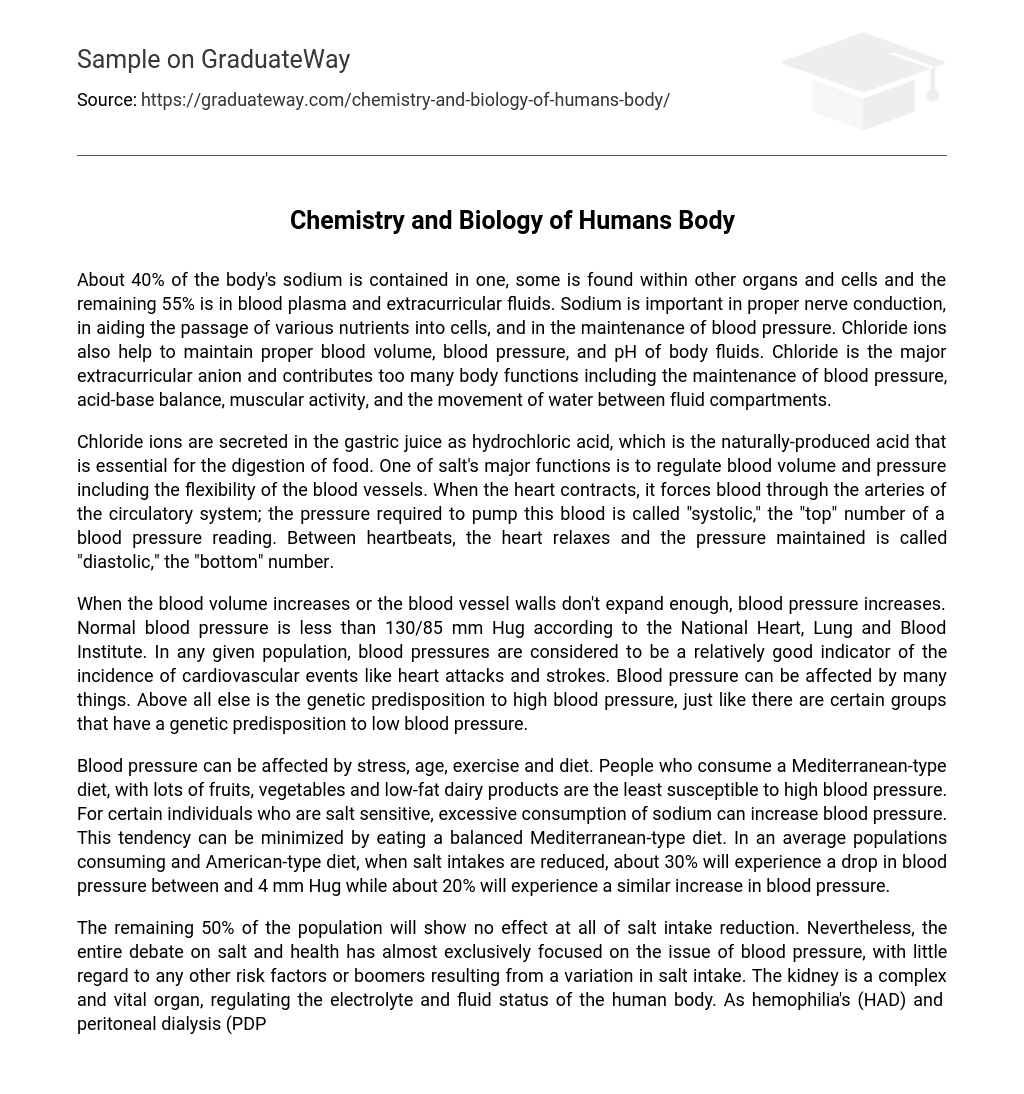About 40% of the body’s sodium is contained in one, some is found within other organs and cells and the remaining 55% is in blood plasma and extracurricular fluids. Sodium is important in proper nerve conduction, in aiding the passage of various nutrients into cells, and in the maintenance of blood pressure. Chloride ions also help to maintain proper blood volume, blood pressure, and pH of body fluids. Chloride is the major extracurricular anion and contributes too many body functions including the maintenance of blood pressure, acid-base balance, muscular activity, and the movement of water between fluid compartments.
Chloride ions are secreted in the gastric juice as hydrochloric acid, which is the naturally-produced acid that is essential for the digestion of food. One of salt’s major functions is to regulate blood volume and pressure including the flexibility of the blood vessels. When the heart contracts, it forces blood through the arteries of the circulatory system; the pressure required to pump this blood is called “systolic,” the “top” number of a blood pressure reading. Between heartbeats, the heart relaxes and the pressure maintained is called “diastolic,” the “bottom” number.
When the blood volume increases or the blood vessel walls don’t expand enough, blood pressure increases. Normal blood pressure is less than 130/85 mm Hug according to the National Heart, Lung and Blood Institute. In any given population, blood pressures are considered to be a relatively good indicator of the incidence of cardiovascular events like heart attacks and strokes. Blood pressure can be affected by many things. Above all else is the genetic predisposition to high blood pressure, just like there are certain groups that have a genetic predisposition to low blood pressure.
Blood pressure can be affected by stress, age, exercise and diet. People who consume a Mediterranean-type diet, with lots of fruits, vegetables and low-fat dairy products are the least susceptible to high blood pressure. For certain individuals who are salt sensitive, excessive consumption of sodium can increase blood pressure. This tendency can be minimized by eating a balanced Mediterranean-type diet. In an average populations consuming and American-type diet, when salt intakes are reduced, about 30% will experience a drop in blood pressure between and 4 mm Hug while about 20% will experience a similar increase in blood pressure.
The remaining 50% of the population will show no effect at all of salt intake reduction. Nevertheless, the entire debate on salt and health has almost exclusively focused on the issue of blood pressure, with little regard to any other risk factors or boomers resulting from a variation in salt intake. The kidney is a complex and vital organ, regulating the electrolyte and fluid status of the human body. As hemophilia’s (HAD) and peritoneal dialysis (PDP) are forms of anal replacement therapy and not an actual kidney, they do not possess the same physiologic regulation of both fluid and electrolytes.
Precise regulation of fluid and electrolytes in the HAD and PDP population remains a constant challenge. In this review, fluid status of both HAD and PDP will be examined, as well as sodium, potassium, phosphorous, and calcium. Each electrolyte will be analyzed by its physiological significance, the complications that will occur when a proper balance cannot be maintained, and methods to correct these imbalances. An overview of the fluid compartments and volume of distribution thin the body will be discussed.
Alliteration, a modality used in both forms of renal replacement therapy, will be defined, along with its impact on fluid status. Fluid assessment will be addressed, along with proper maintenance of fluid homeostasis. By having an understanding of the pathologically behind the fluid and electrolyte abnormalities that occur in end-stage renal disease, one can direct proper management with medications, diet, and alterations in dialysis to provide patients with the most optimal form of renal replacement therapy available.





